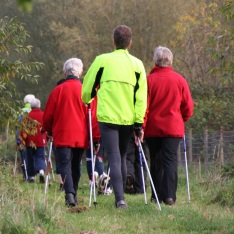People may be more likely to stick to taking exercise if they walk in groups, according to a paper published in the International Journal of Technology Assessment in Health Care.
The research, led by Anglia Ruskin University, also found that group walking plays a part in improved physical activity and better quality of life. The review analysed 18 studies of physically healthy adults walking in groups compared with walking alone or not at all and found that people who had undertaken group walking were more likely to have kept up the exercise by the end of the study, which was an average of six months later.
The authors also found that in five of the seven studies that measured quality of life outcomes, those who walked in groups showed significantly improved scores compare with those who did not, while in the other two studies there was no significant difference.
The World Health Organisation recommends that adults undertake 150 minutes of moderate aerobic physical activity per week. However, only 67% of men and 55% of women in the UK meet these guidelines. Dropout rates for exercise initiatives are also known to be high.
At a time when we are being encouraged to meet physical activity guidelines, a large proportion of the public fail to do so. Our review found that people may be more likely to exercise if they have social support.
